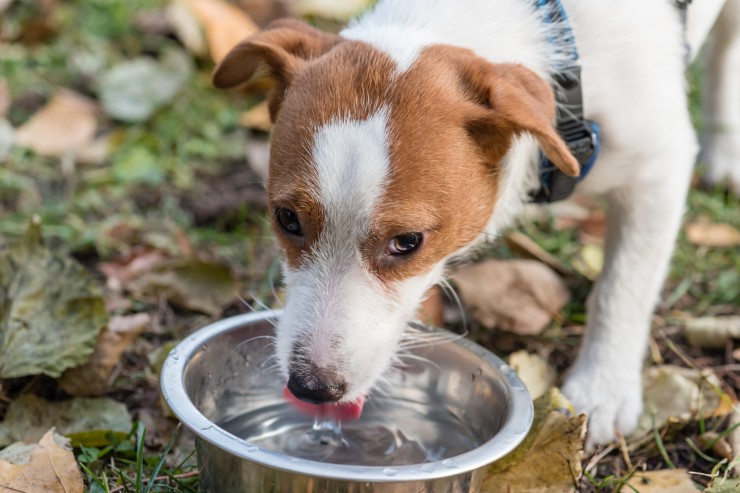There are many different ways that dogs and puppies can get worms. Since most worms are species specific they will only be transferred from dogs to dogs, and cannot be passed to other pets or family members. Some parasites can be transferred between different species of animals and even humans, but these are very rare, especially if the pet owner routinely worms the dog to prevent any possible infections.
The biggest source of contamination or infection of worms or other parasites for dogs is other dogs. This can occur if your dog is playing with other dogs that have worms, sharing the same toys or eating from the same dish. Dogs can also get worms from eating or playing with fecal material from infected dogs. This is a very common source of infection especially if the dog is allowed to run outside the yard or plays in a puppy park or other area where there are many dogs.
There are four types of worms that can infect your dog or puppy. They are roundworms, whipworms, tapeworms and hookworms. Roundworms and tapeworms can often be seen in the fecal material or around the dog's anus in the hair. Whipworms and hookworms are usually too small to be seen by the eye, but are evident to the veterinarian when a stool sample is examined. Tapeworms are rarely seen as entire worms but rather small segments of the worm may be noted. They are while in color and are somewhat flattened in shape and appearance. Roundworms are long, relatively slender and look more like very small earthworms. If they have been out of the dog's body for even a short period of time they may have a yellow color rather than being white.
Roundworms
Many puppies are actually born with roundworm infestations. Since young puppies cannot be wormed until they reach a certain age it is very important to make sure that the mother has been kept worm free to avoid passing on the contamination to her puppies. Round worms eggs can be found in the milk of the mother dog if she is infected. This then passes the worm eggs on to the puppies. The worms live in the intestines of the puppies and constantly lay eggs, up to 200 per day. Some of the eggs are eliminated through the fecal material while still others are able to stay within the digestive tract. Once the eggs hatch they move through the body to the lungs where they irritate the tissue until the puppy or dog coughs. Once the dog coughs the larva are expelled from the lungs into the mouth, where they are swallowed and move down through the digestive tract. This cycle continues with the number of worms dramatically increasing. Severe infestations result in a pot bellied appearance, severe cough, and can eventually lead to death if the intestines become blocked with worms. A full-grown roundworm can reach up to five inches in length.
Whipworms and Hookworms
Of the two hookworms are by far the most serious and can lead to anemia and even death in dogs as these intestinal worms feed off the blood of the dog. Whipworms are not as serious but often cause lethargic behavior in dogs and are often a problem with dogs that are kenneled or boarded in facilities where there are many dogs in one area.
Tapeworms
Tapeworms are problematic because they can affect a dog's overall health and can be passed to various species, especially other dogs and cats. Fleas can pass on tapeworm eggs, so keeping your pet free from fleas is important. Often dogs that hunt rodents and small wild animals are at greatest risk for tapeworms. Tapeworms may be noted as dried up looking rice grains sticking to the fur around the dog's anus. Tapeworms are difficult to treat and over the counter medications for worming will not kill the worms within the dog.
Routine worming at the vets is the best way to control worm problems in your dog. Over the counter worming products rarely work and may simply give the owner a false sense of security when it comes to the health of their pet.

 Special Foods and Lifestyle for a Healthy Dog
Special Foods and Lifestyle for a Healthy Dog
Special Foods and Lifestyle for a Healthy Dog
Special Foods and Lifestyle for a Healthy Dog
 What Drinks Can Dogs Have Apart From Water?
What Drinks Can D
What Drinks Can Dogs Have Apart From Water?
What Drinks Can D
 What Is Lotus Syndrome In Dogs?
What Is Lotus Syn
What Is Lotus Syndrome In Dogs?
What Is Lotus Syn
 Before Buying Puppy
Before Buying Puppy
Puppies are cute and cuddl
Before Buying Puppy
Before Buying Puppy
Puppies are cute and cuddl
 The Dangers Of Not Socialising A Puppy Early Enough
The Dangers Of No
The Dangers Of Not Socialising A Puppy Early Enough
The Dangers Of No